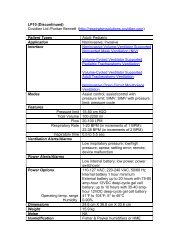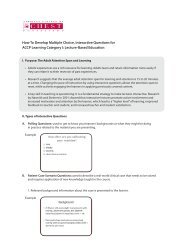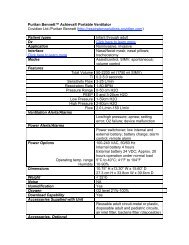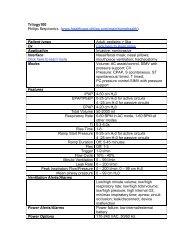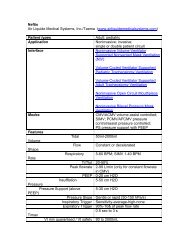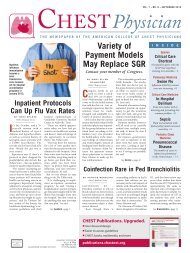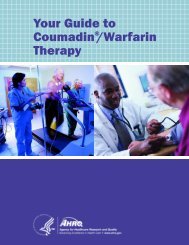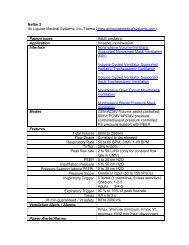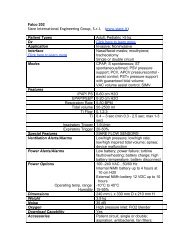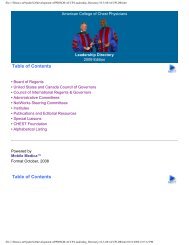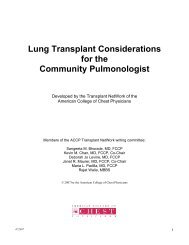12 PEDIATRIC CHEST MEDICINE JANUARY 2011 • CHEST PHYSICIANLive, Inactivated Flu Vaccines Equally Cost EffectiveBY MARY ANN MOONElsevier Global Medical NewsDespite recent reports that the intranasallive attenuated influenzavaccine might cause more adverseevents in young children than does theinactivated influenza vaccine, the costeffectiveness<strong>of</strong> the two approaches remainscomparable, according to a recentstudy.In a mathematical simulation model,both the live attenuated vaccine and theinactivated vaccine yielded similar costeffectivenessratios <strong>of</strong> less than $40,000per quality-adjusted life year (QALY)among children under 5 years, whichcompares well with other well-acceptedpediatric interventions, said Lisa A. Prosser,Ph.D., <strong>of</strong> the University <strong>of</strong> MichiganHealth System, Ann Arbor, and her associates(Arch. Pediatr. Adolesc. Med. 2010[doi:10.1001/archpediatrics.2010.182]).The investigators assessed the costeffectiveness<strong>of</strong> each <strong>of</strong> the vaccines and<strong>of</strong> no vaccination using a mathematicalsimulation model that estimated the effectson influenza-related health outcomesin a hypothetical cohort <strong>of</strong> healthychildren aged 6 months to 4 years.The live attenuated vaccine was projectedto avert more influenza episodes,influenza-related hospitalizations, anddeaths than was the inactivated vaccine.However, this benefit was somewhatcounterbalanced by an increase in adverseevents with the live attenuated vaccine.Under different conditions, the modelshowed that cost-effectiveness ratiosranged from $20,000/QALY to $33,000/QALY with the live attenuated vaccineand $21,000/QALY to $37,000/QALYwith the inactivated vaccine.This study was funded by the Centersfor Disease Control and Preventionthrough the Harvard/CDC Joint Initiativein Vaccine Economics. No financialconflicts <strong>of</strong> interest were reported. ■REVATIO ® (SILDENAFIL)Brief Summary <strong>of</strong> Prescribing InformationINDICATIONS AND USAGE: REVATIO ® is indicated for the treatment <strong>of</strong> pulmonary arterialhypertension (WHO Group I) to improve exercise ability and delay clinical worsening. Thedelay in clinical worsening was demonstrated when REVATIO was added to backgroundepoprostenol therapy.Limitation <strong>of</strong> UseThe efficacy <strong>of</strong> REVATIO has not been adequately evaluated in patients taking bosentan concurrently.DOSAGE AND ADMINISTRATIONPulmonary Arterial Hypertension (PAH)REVATIO TabletsThe recommended dose <strong>of</strong> REVATIO is 20 mg three times a day (TID). REVATIO tabletsshould be taken approximately 4-6 hours apart, with or without food.In the clinical trial no greater efficacy was achieved with the use <strong>of</strong> higher doses.Treatment with doses higher than 20 mg TID is not recommended. Dosages lowerthan 20 mg TID were not tested. Whether dosages lower than 20 mg TID are effectiveis not known.REVATIO InjectionREVATIO injection is for the continued treatment <strong>of</strong> patients with pulmonary arterialhypertension (PAH) who are currently prescribed oral REVATIO and who are temporarilyunable to take oral medication.The recommended dose is 10 mg (corresponding to 12.5 mL) administered as anintravenous bolus injection three times a day. The dose <strong>of</strong> REVATIO injection does not needto be adjusted for body weight.A 10 mg dose <strong>of</strong> REVATIO injection is predicted to provide pharmacological effect <strong>of</strong>sildenafil and its N-desmethyl metabolite equivalent to that <strong>of</strong> a 20 mg oral dose.CONTRAINDICATIONSUse with Organic NitratesDo not use REVATIO in patients taking organic nitrates in any form, either regularly orintermittently. Consistent with its known effects on the nitric oxide/cGMP pathway,sildenafil was shown to potentiate the hypotensive effects <strong>of</strong> nitrates.Hypersensitivity ReactionsREVATIO is contraindicated in patients with a known hypersensitivity to sildenafil or anycomponent <strong>of</strong> the tablet.Rare cases <strong>of</strong> hypersensitivity have been reported in association with the use <strong>of</strong> sildenafilincluding anaphylactic reaction/shock events and anaphylactoid reaction. The majority <strong>of</strong>reported events were non-serious hypersensitivity reactions.WARNINGS AND PRECAUTIONSCardiovascular EffectsREVATIO has vasodilatory properties, resulting in mild and transient decreases in bloodpressure. Before prescribing REVATIO, carefully consider whether patients with certainunderlying conditions could be adversely affected by such vasodilatory effects(e.g., patients with resting hypotension [BP < 90/50], fluid depletion, severe left ventricularoutflow obstruction, or autonomic dysfunction).Pulmonary vasodilators may significantly worsen the cardiovascular status <strong>of</strong> patientswith pulmonary veno-occlusive disease (PVOD). Since there are no clinical data onadministration <strong>of</strong> REVATIO to patients with veno-occlusive disease, administration <strong>of</strong>REVATIO to such patients is not recommended. Should signs <strong>of</strong> pulmonary edema occurwhen REVATIO is administered, consider the possibility <strong>of</strong> associated PVOD.As there are no controlled clinical data on the safety or efficacy <strong>of</strong> REVATIO in the followinggroups, prescribe with caution for:• Patients who have suffered a myocardial infarction, stroke, or life-threatening arrhythmiawithin the last 6 months;• Patients with coronary artery disease causing unstable angina;• Patients with hypertension (BP > 170/110);• Patients currently on bosentan therapy.Use with Alpha-blockersPDE5 inhibitors, including sildenafil, and alpha-adrenergic blocking agents are bothvasodilators with blood pressure-lowering effects. When vasodilators are used incombination, an additive effect on blood pressure may be anticipated. In some patients,concomitant use <strong>of</strong> these two drug classes can lower blood pressure significantly,leading to symptomatic hypotension. In the sildenafil interaction studies with alphablockers,cases <strong>of</strong> symptomatic hypotension consisting <strong>of</strong> dizziness andlightheadedness were reported [see Drug Interactions]. No cases <strong>of</strong> syncope or faintingwere reported during these interaction studies. The safety <strong>of</strong> combined use <strong>of</strong> PDE5inhibitors and alpha-blockers may be affected by other variables, including intravascularvolume depletion and concomitant use <strong>of</strong> anti-hypertensive drugs.Effects on BleedingIn humans, sildenafil has no effect on bleeding time when taken alone or with aspirin. In vitro studieswith human platelets indicate that sildenafil potentiates the anti-aggregatory effect <strong>of</strong> sodiumnitroprusside (a nitric oxide donor).The combination <strong>of</strong> heparin and sildenafil had an additive effecton bleeding time in the anesthetized rabbit, but this interaction has not been studied in humans.The incidence <strong>of</strong> epistaxis was 13% in patients taking sildenafil with PAH secondary toconnective tissue disease (CTD). This effect was not seen in primary pulmonaryhypertension (PPH) (sildenafil 3%, placebo 2%) patients. The incidence <strong>of</strong> epistaxis wasalso higher in sildenafil-treated patients with a concomitant oral vitamin K antagonist(9% versus 2% in those not treated with concomitant vitamin K antagonist).The safety <strong>of</strong> REVATIO is unknown in patients with bleeding disorders or active peptic ulceration.Use with Ritonavir and Other Potent CYP3A InhibitorsThe concomitant administration <strong>of</strong> the protease inhibitor ritonavir (a highly potentCYP3A inhibitor) substantially increases serum concentrations <strong>of</strong> sildenafil; therefore,co-administration <strong>of</strong> ritonavir or other potent CYP3A inhibitors with REVATIO is not recommended.Effects on the EyeAdvise patients to seek immediate medical attention in the event <strong>of</strong> a sudden loss <strong>of</strong> visionin one or both eyes while taking PDE5 inhibitors, including REVATIO. Such an event may bea sign <strong>of</strong> non-arteritic anterior ischemic optic neuropathy (NAION), a cause <strong>of</strong> decreasedvision including permanent loss <strong>of</strong> vision, that has been reported postmarketing in temporalassociation with the use <strong>of</strong> all PDE5 inhibitors, including sildenafil, when used in thetreatment <strong>of</strong> erectile dysfunction. It is not possible to determine whether these events arerelated directly to the use <strong>of</strong> PDE5 inhibitors or to other factors. <strong>Physicians</strong> should alsodiscuss the increased risk <strong>of</strong> NAION with patients who have already experienced NAION inone eye, including whether such individuals could be adversely affected by use <strong>of</strong>vasodilators, such as PDE5 inhibitors [see Adverse Reactions].There are no controlled clinical data on the safety or efficacy <strong>of</strong> REVATIO in patients withretinitis pigmentosa, a minority whom have genetic disorders <strong>of</strong> retinal phosphodiesterases.Prescribe REVATIO with caution in these patients.Hearing ImpairmentAdvise patients to seek prompt medical attention in the event <strong>of</strong> sudden decrease or loss <strong>of</strong>hearing while taking PDE5 inhibitors, including REVATIO.These events, which may beaccompanied by tinnitus and dizziness, have been reported in temporal association to the intake<strong>of</strong> PDE5 inhibitors, including REVATIO. It is not possible to determine whether these events arerelated directly to the use <strong>of</strong> PDE5 inhibitors or to other factors [see Adverse Reactions].Combination with other PDE5 inhibitorsSildenafil is also marketed as VIAGRA ® . The safety and efficacy <strong>of</strong> combinations <strong>of</strong> REVATIOwith VIAGRA or other PDE5 inhibitors have not been studied. Inform patients taking REVATIOnot to take VIAGRA or other PDE5 inhibitors.Prolonged ErectionUse REVATIO with caution in patients with anatomical deformation <strong>of</strong> the penis(e.g., angulation, cavernosal fibrosis, or Peyronie’s disease) or in patients who haveconditions, which may predispose them to priapism (e.g., sickle cell anemia, multiplemyeloma, or leukemia). In the event <strong>of</strong> an erection that persists longer than 4 hours,the patient should seek immediate medical assistance. If priapism (painful erectiongreater than 6 hours in duration) is not treated immediately, penile tissue damageand permanent loss <strong>of</strong> potency could result.ADVERSE REACTIONSThe following serious adverse reactions are discussed elsewhere in the labeling:• Hypotension [see Warnings and Precautions]• Vision loss [see Warnings and Precautions]• Hearing loss [see Warnings and Precautions]• Priapism [see Warnings and Precautions]Clinical Trials ExperienceBecause clinical trials are conducted under widely varying conditions, adverse reactionrates observed in the clinical trials <strong>of</strong> a drug cannot be directly compared to rates in theclinical trials <strong>of</strong> another drug and may not reflect the rates observed in practice.Safety data were obtained from the 12 week, placebo-controlled clinical study and anopen-label extension study in 277 treated patients with pulmonary arterial hypertension.Doses up to 80 mg TID were studied.The overall frequency <strong>of</strong> discontinuation in REVATIO-treated patients at the recommendeddose <strong>of</strong> 20 mg TID was 3% and was the same for the placebo group.In the placebo-controlled trial in pulmonary arterial hypertension, the adverse drug reactionsthat were reported by at least 3% <strong>of</strong> REVATIO patients treated at the recommended dosage(20 mg TID) and were more frequent in REVATIO patients than placebo patients, are shownin Table 1. Adverse events were generally transient and mild to moderate in nature.Table 1. REVATIO All Causality Adverse Events in ≥ 3% <strong>of</strong> Patients and More Frequent(> 1%) than PlaceboADVERSE EVENTS Placebo Revatio 20 mg TID Placebo-% (n=70) (n=69) SubtractedEpistaxis 1 9 8Headache 39 46 7Dyspepsia 7 13 6Flushing 4 10 6Insomnia 1 7 6Erythema 1 6 5Dyspnea exacerbated 3 7 4Rhinitis nos 0 4 4Diarrhea nos 6 9 3Myalgia 4 7 3Pyrexia 3 6 3Gastritis nos 0 3 3Sinusitis 0 3 3Paresthesia 0 3 3nos: Not otherwise specifiedAt doses higher than the recommended 20 mg TID, there was a greater incidence <strong>of</strong>some adverse events including flushing, diarrhea, myalgia and visual disturbances.Visual disturbances were identified as mild and transient, and were predominatelycolortinge to vision, but also increased sensitivity to light or blurred vision.The incidence <strong>of</strong> retinal hemorrhage at the recommended sildenafil 20 mg TID dosewas 1.4% versus 0% placebo and for all sildenafil doses studied was 1.9% versus0% placebo. The incidence <strong>of</strong> eye hemorrhage at both the recommended dose andat all doses studied was 1.4% for sildenafil versus 1.4% for placebo. The patientsexperiencing these events had risk factors for hemorrhage including concurrentanticoagulant therapy.
JANUARY 2011 • CHEST PHYSICIAN PEDIATRIC CHEST MEDICINE 13VITALSInfant Vaccinations Met Goals <strong>of</strong> Healthy People 2010Major Finding: Vaccination coverage remainedat 90% or greater for most routinevaccines administered to children 19-35months <strong>of</strong> age in the United States in 2009.Data Source: The 2009 National ImmunizationSurvey <strong>of</strong> U.S. households, with reportsverified for 17,313 children whose providersprovided vaccination records.Disclosures: Dr. Schuchat had no relevantdisclosures.In a placebo-controlled fixed dose titration study <strong>of</strong> REVATIO (starting withrecommended dose <strong>of</strong> 20 mg TID and increased to 40 mg TID and then 80 mg TID)as an adjunct to intravenous epoprostenol in pulmonary arterial hypertension, theadverse events that were reported were more frequent than in the placebo arm (>6%difference) are shown in Table 2.Table 2. REVATIO-Epoprostenol Adverse Events More Frequent (> 6%) than PlaceboADVERSE EVENTS Placebo Revatio Placebo-Subtracted% Epoprostenol Epoprostenol %(n = 131) (n = 134)Headache 34 57 23Edema^ 13 25 14Dyspepsia 2 16 14Pain in extremity 6 17 11Diarrhea 18 25 7Nausea 18 25 7Nasal congestion 2 9 7^includes peripheral edemaREVATIO InjectionREVATIO injection was studied in a 66-patient, placebo-controlled study at doses targetingplasma concentrations between 10 and 500 ng/mL (up to 8 times the exposure <strong>of</strong> therecommended dose).Adverse events in PAH patients were similar to those seen with oral tablets.Postmarketing ExperienceThe following adverse reactions have been identified during postapproval use <strong>of</strong> sildenafil(marketed for both PAH and erectile dysfunction). Because these reactions are reportedvoluntarily from a population <strong>of</strong> uncertain size, it is not always possible to reliably estimatetheir frequency or establish a causal relationship to drug exposure.Cardiovascular EventsIn postmarketing experience with sildenafil at doses indicated for erectile dysfunction,serious cardiovascular, cerebrovascular, and vascular events, including myocardial infarction,sudden cardiac death, ventricular arrhythmia, cerebrovascular hemorrhage, transientischemic attack, hypertension, pulmonary hemorrhage, and subarachnoid and intracerebralhemorrhages have been reported in temporal association with the use <strong>of</strong> the drug. Most, butnot all, <strong>of</strong> these patients had preexisting cardiovascular risk factors. Many <strong>of</strong> these eventswere reported to occur during or shortly after sexual activity, and a few were reported tooccur shortly after the use <strong>of</strong> sildenafil without sexual activity. Others were reported to haveoccurred hours to days after use concurrent with sexual activity. It is not possible todetermine whether these events are related directly to sildenafil, to sexual activity, to thepatient’s underlying cardiovascular disease, or to a combination <strong>of</strong> these or other factors.Decreases in and Loss <strong>of</strong> VisionWhen used to treat erectile dysfunction, non-arteritic anterior ischemic optic neuropathy(NAION), a cause <strong>of</strong> decreased vision including permanent loss <strong>of</strong> vision, has beenreported postmarketing in temporal association with the use <strong>of</strong> phosphodiesterase type 5(PDE5) inhibitors, including sildenafil. Most, but not all, <strong>of</strong> these patients had underlyinganatomic or vascular risk factors for developing NAION, including but not necessarilylimited to: low cup to disc ratio (“crowded disc”), age over 50, diabetes, hypertension,coronary artery disease, hyperlipidemia and smoking. It is not possible to determinewhether these events are related directly to the use <strong>of</strong> PDE5 inhibitors, to the patient’sunderlying vascular risk factors or anatomical defects, to a combination <strong>of</strong> these factors,or to other factors [see Warnings and Precautions].Loss <strong>of</strong> HearingCases <strong>of</strong> sudden decrease or loss <strong>of</strong> hearing have been reported postmarketing intemporal association with the use <strong>of</strong> PDE5 inhibitors, including REVATIO. In some <strong>of</strong> thecases, medical conditions and other factors were reported that may have also played a rolein the otologic adverse events. In many cases, medical follow-up information was limited. Itis not possible to determine whether these reported events are related directly to the use <strong>of</strong>REVATIO, to the patient’s underlying risk factors for hearing loss, a combination <strong>of</strong> thesefactors, or to other factors [see Warnings and Precautions].Other EventsThe following list includes other adverse events that have been identified duringpostmarketing use <strong>of</strong> REVATIO. The list does not include adverse events that are reportedfrom clinical trials and that are listed elsewhere in this section. These events have beenchosen for inclusion either due to their seriousness, reporting frequency, lack <strong>of</strong> clearalternative causation, or a combination <strong>of</strong> these factors. Because these reactions werereported voluntarily from a population <strong>of</strong> uncertain size, it is not possible to reliablyestimate their frequency or establish a causal relationship to drug exposure.Nervous system: Seizure, seizure recurrenceDRUG INTERACTIONSNitratesConcomitant use <strong>of</strong> REVATIO with nitrates in any form is contraindicated[see Contraindications].Ritonavir and other Potent CYP3A InhibitorsConcomitant use <strong>of</strong> REVATIO with ritonavir and other potent CYP3A inhibitors is notrecommended [see Warnings and Precautions].Alpha-blockersUse caution when co-administering alpha-blockers with REVATIO because <strong>of</strong> additive bloodpressure-lowering effects [see Warnings and Precautions].BY DAMIAN McNAMARAElsevier Global Medical NewsATLANTA – Vaccination <strong>of</strong> U.S.infants 19-35 months <strong>of</strong> age remainshigh at 90% or greater forroutine immunizations, accordingto results <strong>of</strong> the 2009 National ImmunizationSurvey released by theCenters for Disease Control andPrevention.This means vaccine coverage in2009 met or exceeded the 90% goalset by the national Healthy People2010 initiative.This survey <strong>of</strong> vaccinations for17,313 children nationwide revealedthat less than 1% <strong>of</strong> young childrenborn between January 2006 andJuly 2008 received no vaccinations(MMWR 2010;59:1171-7).“Today’s report is generally veryreassuring, despite concerns we’veseen in the past about whetherIn drug-drug interaction studies, sildenafil (25 mg, 50 mg, or 100 mg) and the alpha-blockerdoxazosin (4 mg or 8 mg) were administered simultaneously to patients with benignprostatic hyperplasia (BPH) stabilized on doxazosin therapy. In these study populations,mean additional reductions <strong>of</strong> supine systolic and diastolic blood pressure <strong>of</strong> 7/7 mmHg,9/5 mmHg, and 8/4 mmHg, respectively, were observed. Mean additional reductions <strong>of</strong>standing blood pressure <strong>of</strong> 6/6 mmHg, 11/4 mmHg, and 4/5 mmHg, respectively, were alsoobserved. There were infrequent reports <strong>of</strong> patients who experienced symptomatic posturalhypotension. These reports included dizziness and light-headedness, but not syncope.AmlodipineWhen sildenafil 100 mg oral was co-administered with amlodipine, 5 mg or 10 mg oral, tohypertensive patients, the mean additional reduction on supine blood pressure was 8 mmHgsystolic and 7 mmHg diastolic.USE IN SPECIFIC POPULATIONSPregnancyPregnancy Category BNo evidence <strong>of</strong> teratogenicity, embryotoxicity, or fetotoxicity was observed in pregnant rats or rabbitsdosed with sildenafil 200 mg/kg/day during organogenesis, a level that is, on a mg/m 2 basis, 32-and 68-times, respectively, the recommended human dose (RHD) <strong>of</strong> 20 mg TID. In a rat pre- andpostnatal development study, the no-observed-adverse-effect dose was 30 mg/kg/day (equivalentto 5-times the RHD on a mg/m 2 basis).There are, however, no adequate and well-controlled studies<strong>of</strong> sildenafil in pregnant women. Because animal reproduction studies are not always predictive <strong>of</strong>human response, this drug should be used during pregnancy only if clearly needed.Labor and DeliveryThe safety and efficacy <strong>of</strong> REVATIO during labor and delivery has not been studied.Nursing MothersIt is not known if sildenafil or its metabolites are excreted in human breast milk. Becausemany drugs are excreted in human milk, caution should be exercised when REVATIO isadministered to a nursing woman.Pediatric UseSafety and effectiveness <strong>of</strong> sildenafil in pediatric pulmonary hypertension patients have notbeen established.Geriatric UseClinical studies <strong>of</strong> REVATIO did not include sufficient numbers <strong>of</strong> subjects aged 65 and over todetermine whether they respond differently from younger subjects. Other reported clinicalexperience has not identified differences in responses between the elderly and younger patients. Ingeneral, dose selection for an elderly patient should be cautious, reflecting the greater frequency <strong>of</strong>decreased hepatic, renal, or cardiac function, and <strong>of</strong> concomitant disease or other drug therapy.Hepatic ImpairmentNo dose adjustment for mild to moderate impairment is required. Severe impairmenthas not been studied.Renal ImpairmentNo dose adjustment is required (including severe impairment CLcr < 30 mL/min).OVERDOSAGEIn studies with healthy volunteers <strong>of</strong> single doses up to 800 mg, adverse events weresimilar to those seen at lower doses but rates and severities were increased.In cases <strong>of</strong> overdose, standard supportive measures should be adopted as required. Renaldialysis is not expected to accelerate clearance as sildenafil is highly bound to plasmaproteins and it is not eliminated in the urine.NONCLINICAL TOXICOLOGYCarcinogenesis, Mutagenesis, Impairment <strong>of</strong> FertilitySildenafil was not carcinogenic when administered to rats for up to 24 months at60 mg/kg/day, a dose resulting in total systemic exposure (AUC) to unbound sildenafil andits major metabolite 33 and 37 times, for male and female rats respectively, the humanexposure at the RHD <strong>of</strong> 20 mg TID. Sildenafil was not carcinogenic when administered tomale and female mice for up to 21 and 18 months, respectively, at doses up to a maximallytolerated level <strong>of</strong> 10 mg/kg/day, a dose equivalent to the RHD on a mg/m 2 basis.Sildenafil was negative in in vitro bacterial and Chinese hamster ovary cell assays todetect mutagenicity, and in vitro human lymphocytes and in vivo mouse micronucleusassays to detect clastogenicity.There was no impairment <strong>of</strong> fertility in male or female rats given up to 60 mg sildenafil/kg/day, adose producing a total systemic exposure (AUC) to unbound sildenafil and its major metabolite <strong>of</strong> 19and 38 times for males and females, respectively, the human exposure at the RHD <strong>of</strong> 20 mg TID.PATIENT COUNSELING INFORMATION• Inform patients <strong>of</strong> contraindication <strong>of</strong> REVATIO with regular and/or intermittent use <strong>of</strong> organic nitrates.• Inform patients that sildenafil is also marketed as VIAGRA for erectile dysfunction.Advise patients taking REVATIO not to take VIAGRA or other PDE5 inhibitors.• Advise patients to seek immediate medical attention in the event <strong>of</strong> a sudden loss <strong>of</strong>vision in one or both eyes while taking REVATIO. Such an event may be a sign <strong>of</strong> NAION.• Advise patients to seek prompt medical attention in the event <strong>of</strong> sudden decrease or loss <strong>of</strong>hearing while taking REVATIO. These events may be accompanied by tinnitus and dizziness.RX onlyRevised: November 2009RVU00106A ©2010 Pfizer Inc All rights reserved. Printed in USA/January 2010U.S. Pharmaceuticalsparents are continuing to have their childrenvaccinated, and despite some resurgencesin vaccine-preventable diseasesin particular areas,” Dr. Anne Schuchat,director <strong>of</strong> the National Center for Immunizationand Respiratory Diseases atthe CDC, said during a telebriefing.Some substantial variation in vaccinecoverage between states was again revealedby this annual survey, suggestingthat there is still work to be done in somecommunities.Dr. Schuchat addressed the outbreak<strong>of</strong> pertussis cases in California, responsiblefor nine infant deaths since January2010. The coverage in California for fourdoses <strong>of</strong> DTaP, the pertussis-containingshot for babies, was 83%, according tostate records. “We don’t think it’s thecoverage level in babies and toddlers thatis leading to that pertussis challenge inCalifornia.” Instead, “we think the challengewith those pertussis cases is the increasingvaccination <strong>of</strong> teens and adults,”she said, although “it continues to be importantfor babies and toddlers to gettheir DTaP doses.”The CDC strongly recommendseveryone aged 11 years and older, particularlynew parents and those in closecontact with young children, receivethe vaccination against pertussis. Dr.Schuchat said, “The situation in Californiais serious, and we are working togetherwith the California healthdepartment to really promote uptake <strong>of</strong>the pertussis vaccine for teens andadults.”The survey showed national coveragefor MMR vaccinations experienced “asignificant but not large” drop from 92%in 2008 to 90% in 2009. “That might bea warning sign <strong>of</strong> larger drops to comeor a small change that, because our surveyis so large, was statistically significant,”Dr. Schuchat said. Even thoughnational coverage numbers are 90%,“you can still have large pockets <strong>of</strong> susceptiblechildren.”“Those two examples [pertussis andmeasles] show that we cannot let ourguard down,” Dr. Schuchat said.The survey also revealed a substantialdrop in coverage for one vaccine,Haemophilus influenzae B (Hib). A total <strong>of</strong>84% <strong>of</strong> children aged 19-35 months receivedthe three recommended doses inthe survey. This represents a decrease <strong>of</strong>more than 6 percentage points vs. 2008that “really just reflects the nationalshortage” <strong>of</strong> this vaccine between December2007 and September 2009, Dr.Schuchat said. She commended cliniciansfor following recommendations todrop the booster shot during this shortage,and added that the vaccine is nowreadily available.Other survey findings indicate that44% <strong>of</strong> children received full coveragefor the rotavirus vaccine during infancy.This is the first national survey data to reportadoption <strong>of</strong> the rotavirus vaccinesince its U.S. licensure in 2006. “That isreally good uptake <strong>of</strong> this vaccine. Ofcourse, we’re already seeing a very importantdrop in disease caused by therotavirus,” Dr. Schuchat said. ■




